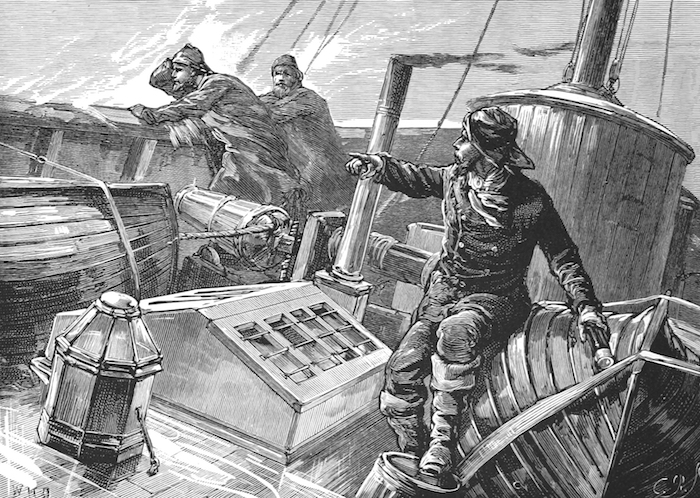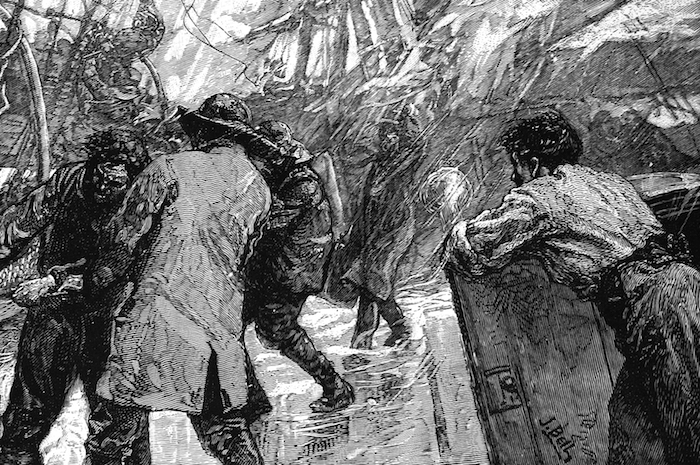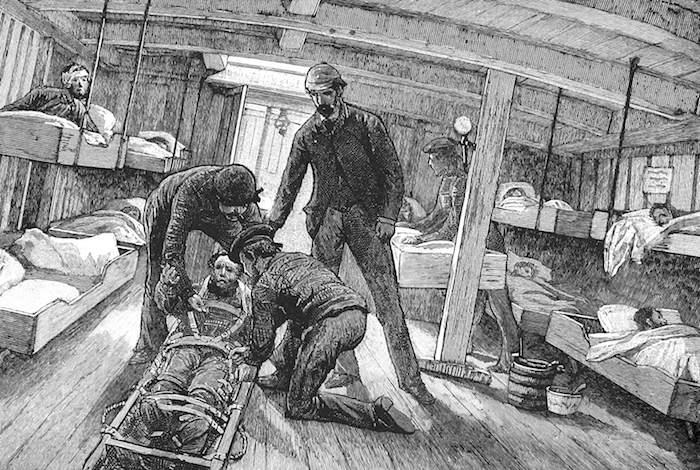Shanty Hunters, my upcoming RPG about collecting magical sea shanties in 1880, goes live on Kickstarter on November 2nd. This week on the blog, I’d like to offer a sneak peek: an excerpt about who sailors are as people and another historical shanty from the shanty songbook. Last month, we peeked at an excerpt about the sea. In July, we looked at the book’s first five pages. To learn more about Shanty Hunters and be notified when the Kickstarter launches, follow this link!
This post is brought to you by beloved Patreon backer Colin Wixted. Thanks for helping keep the lights on! If you want to help keep this blog going alongside Colin, head over to the Patreon page – and thank you!

You can spot a sailor even when he’s out of his tar-stained clothes. The sunburned face, the wide step, the rolling gait, the muscular, calloused hands – these are the external marks of the sailor. But what of the internal marks? Who are these people? What makes them go to sea?
The primary motivation is poverty. Most sailors are forced into life at sea by financial hardship; the daily wage is better than that of a common laborer ashore. But the money doesn’t last. Most sailors are spend-thrifts. After a few weeks ashore, they’ve blown through months of back pay on liquor, women, and dice, and it’s back to sea to pay off their newfound debts. Still, for a lucky few, sailing offers a way out of the working class. If you’re willing to put in decades of work and have good connections, you might rise to the rank of mate, and then captain. Captains are still just employees (the real money’s in owning ships, not skippering them), but they’re well-paid employees, and most ascend to the middle class.
Besides financial desperation, some sailors go to sea and stay there because they need the structure and purpose. Some are fleeing the law. Others are fleeing a person: an unwanted child, a hateful parent, or a powerful enemy. Few have much in the way of family or anything else that would attach them to the shore. For some sailors, going to sea is a substitute for suicide. To quote Ishmael from Moby Dick: “With a philosophical flourish Cato throws himself upon his sword; I quietly take to the ship.”
The decision to become a sailor is often made lightly. Young people seldom consider the impact of what they do before it is done. The decision to remain a sailor is more serious. It means endless months of hard work and little sleep. It means damaging your body irreparably and ‘retiring’ at middle age when you’re too broke-down to do the work anymore. Worst of all, it means severing ties with any loved ones you may have ashore. Most long-haul merchant sailors don’t have wives, and those who do see them for a few months every one to three years.

But being a sailor brings joys few landsmen experience. If you are lucky, you find a deep camaraderie with your shipmates. You visit ports in nations your siblings might not have even heard of. And you get to experience the inexpressible grandeur of the open ocean. The career sailor, the old salt, is a breed apart.
Living at sea generates an unusual psychology. When your life is at risk every minute, everything becomes a joke. A tumble from the tops broken at the last second by falling into the mainsaill is cause for a laugh. It has to be – if you stop to think about it, you might never go aloft again. Sailors may appear unfeeling. Their jokes are cruel. They hide their wounds, both literal and figurative. Most are believers, but have little time for religion.
Sailors form peculiar relationships. If two men dislike each other, making them live together in a cramped, dark foc’s’le for a year will make them hate each other. The bad food, monotony, and deprivation encourage people to snap, to say things they don’t mean. But for sailors who get along, the proximity and shared suffering forge deep and lasting friendships. Your fellow crew are never strangers. They are your best friends and a few dire enemies. One or two may even be your lovers; same-sex romance aboard ship is always secret but seldom absent.
The final element of a sailor’s unique psychology is his work ethic. In an emergency and when he feels he is being put to good use, it is limitless. Given how much work there is to do aboard ship, that’s fortunate! But the instant he feels he’s being assigned busywork, he turns into a master malingerer. A job the crew could complete in an hour might take them two days. A sailor can’t refuse an order, but he can climb the rigging slowly, realize at the top he forgot a tool, slowly descend, go below to look for it, only find it when a mate goes below twenty minutes later to check on him, then slowly climb the rigging once again. Sailors call this slow labor ‘soldiering’.

Merchant sailors come from exceptionally diverse origins. Many are from port towns like Liverpool and Shanghai, but others are from far inland. Some come from places where it seems like everyone is a sailor, like Matthews County, Virginia or Freetown, Sierra Leone. Others are the first from their parish to go to sea. British shipping companies recruit heavily in Gujarat and Malabar in India. Clipper ships often take on new hands in Chinese ports even though the Qing government theoretically forbids Chinese citizens from leaving the country. The Kru people of West Africa have been employed aboard European vessels for centuries. You also have plenty of Malay, Arabian, and South Sea Islander sailors and black sailors from the Caribbean and the American South. In 1880, most American black sailors are freedmen, born enslaved. Almost all non-white sailors are paid worse than their white shipmates and have little chance of becoming a mate, but the grinding poverty they face at home leaves many feeling like they have no choice.
Sailors in 1880 are almost universally male. The rare exceptions are worth mentioning, though! Some women, like Mary Anne Talbot, disguise themselves as men to work as sailors. This is more feasible than you might expect. It isn’t unusual for someone to never fully undress, the rigors of shipboard life tend to halt menstruation, and men see what they expect to see. Other women, like Philomène Daniels, work openly, usually in positions of authority that protect them from their male shipmates. And some mates and captains bring their wives aboard with them for the voyage. Players who want to play sailor PCs should feel no pressure to make them male. The PCs are, by definition, exceptional.

Lowlands Low
This song is a terrific example of how hazy the line between shanties and forebitters can be (see p. 7 in the actual book). It’s better-known not as a shanty but as the traditional English folk ballad Golden Vanity.
Suggested Cover: For a slow, mournful version, try Golden Vanity by Gordon Bok on the album The Ways of Man (1978). For something with a more upbeat clip, try Golden Vanity by Peter, Paul, and Mary on the album Flowers and Stones (1990).
There once was a skipper who was boasting on the quay
“Oh, I have a ship and a gallant ship is she
Of all the ships I know, she is far the best to me
And she’s sailing in the lowlands, lowlands, lowlands
Sailing in the lowlands low
“Oh, I had her built in the north a-counteree
And I had her christened the Golden Vanity
I armed her and manned her and set her off to sea
And she’s sailing in the lowlands, lowlands, lowlands
Sailing in the lowlands low”
Then up spoke a sailor who had just returned from sea
“Oh, I was aboard of the Golden Vanity
When she was held in chase by a Spanish piratee
And we sank her in the lowlands, lowlands, lowlands
Sank her in the lowlands low
“Oh, we had aboard of us a little cabin-boy
Who said ‘What will you give me if the galley I destroy?’
‘Oh you can wed my daughter, she is my pride and joy
If you sink her in the lowlands, lowlands, lowlands
Sink her in the lowlands low’
“So the boy bared his breast and he plunged in the tide
And he swam until he came to the rascal pirate’s side
He climbed on deck and went below, by none was he espied
And he sank ‘em in the lowlands, lowlands, lowlands
Sank ‘em in the lowlands low
“He bore with his augur, he bored once and twice
And some were playing cards and some were playing dice
And the water flowed in and dazzled their eyes
And he sank ‘em in the lowlands, lowlands, lowlands
Sank ‘em in the lowlands low
“Oh, some were playing cards and some were playing dice
And some were in their hammocks a-sporting with their wives
And then he let the water in and put out all their lights
And he sank ‘em in the lowlands, lowlands, lowlands
Sank ‘em in the lowlands low
“Then the cabin-boy did swim over to the starboard(1) side
Saying ‘Cap’n take me up, I am drifting with the tide.’
‘I’ll shoot you, I’ll kill you, you shall not have your bride
I will sink you in the lowlands, lowlands, lowlands
Sink you in the lowlands low’
“‘If it wasn’t for my love for your daughter and your men
I would do unto you as I did unto them
I would use my trusty augur and do the job again
And I’d sink you in the lowlands, lowlands, lowlands
Sink you in the lowlands low
“Then the cabin-boy did swim over to the larboard(2) side
Saying ‘Shipmates take me up, for I’m drowning with the tide.’
They hauled him up so quickly, but when on deck he died
And they buried’m(3) in the lowlands, lowlands, lowlands
Buried’m in the lowlands low
“And his shipmates took him up, and when on deck he died
They sewed him in his hammock which was so strong’n wide
They said a short prayer over him, and dropped him in the tide
And they sailed from the lowlands, lowlands, lowlands
Sailed from the lowlands low
“Here’s a curse upon that captain, wherever he may be
For taking that poor cabin-boy so far away to sea
For taking that poor cabin-boy so far away to sea
And to leave him in the lowlands, lowlands, lowlands
To leave him in the lowlands low”
1: The ship’s right side when you’re facing forward.
2: Port. The left side when you’re facing forward.
3: Burial at sea. See next verse.






